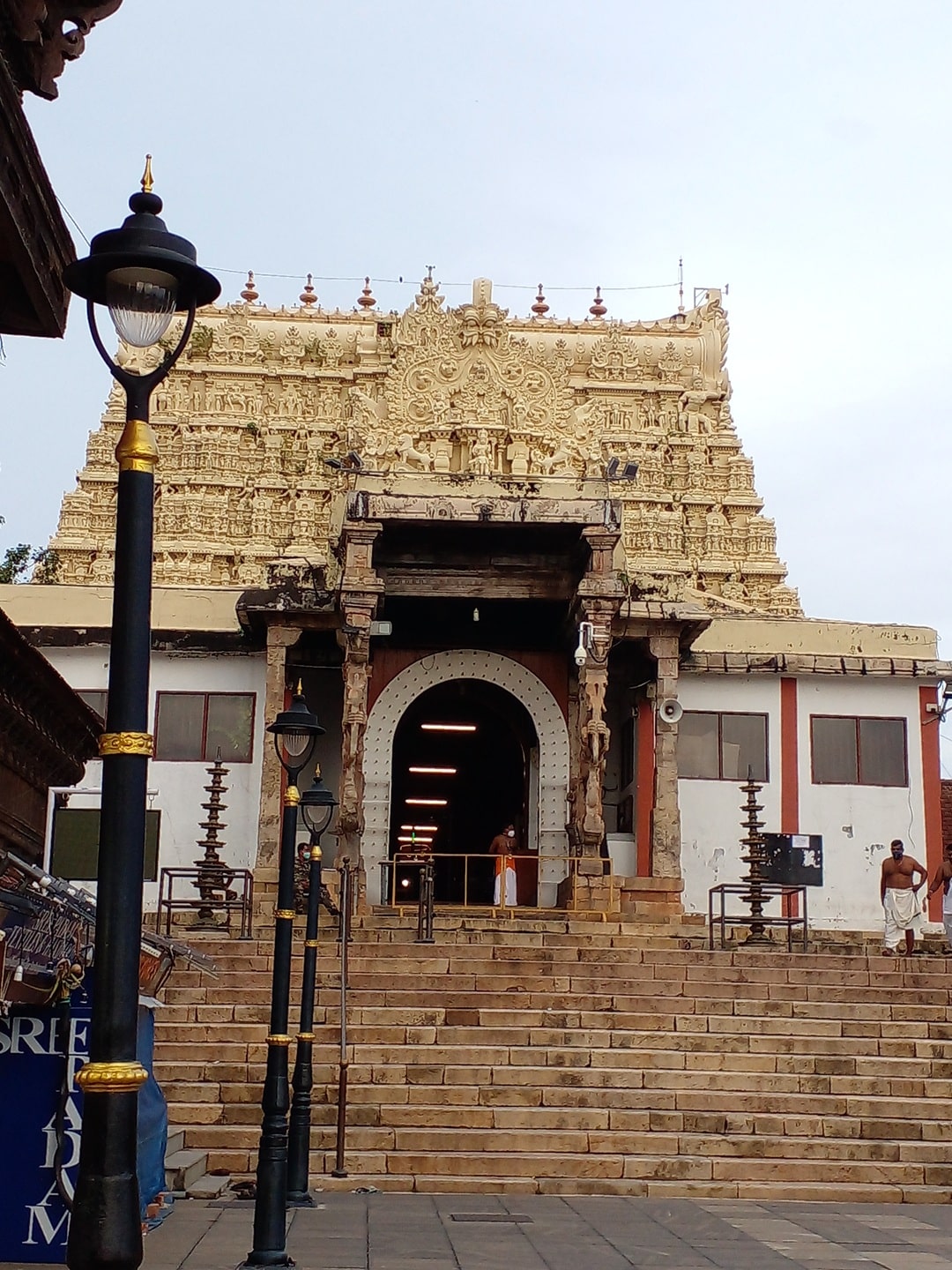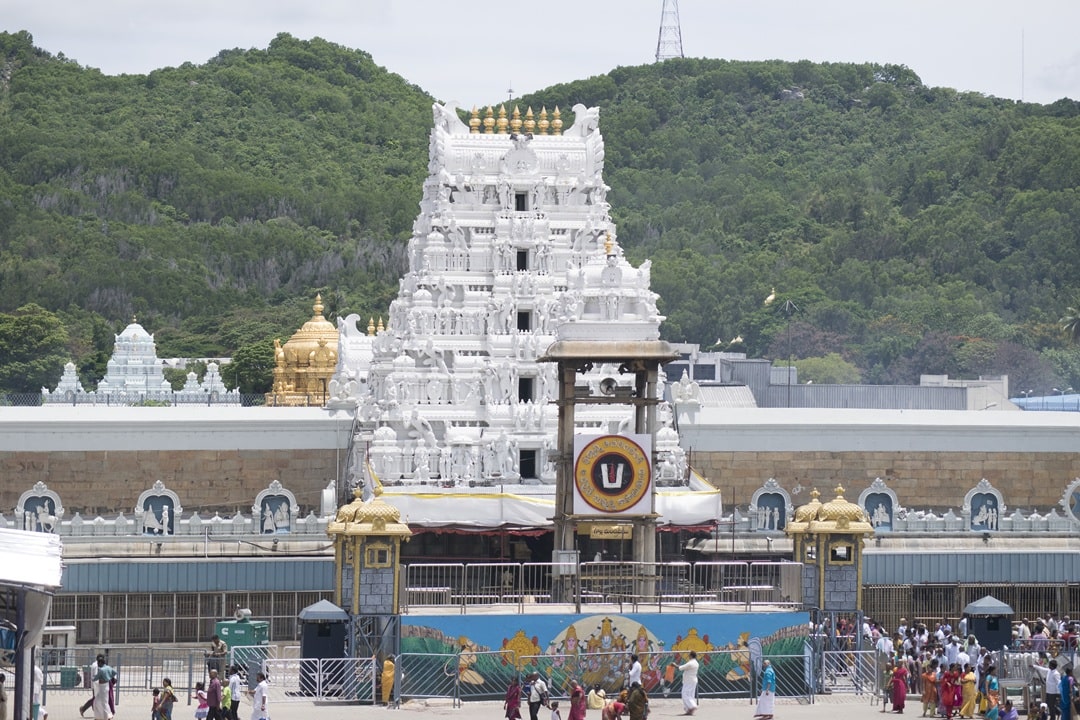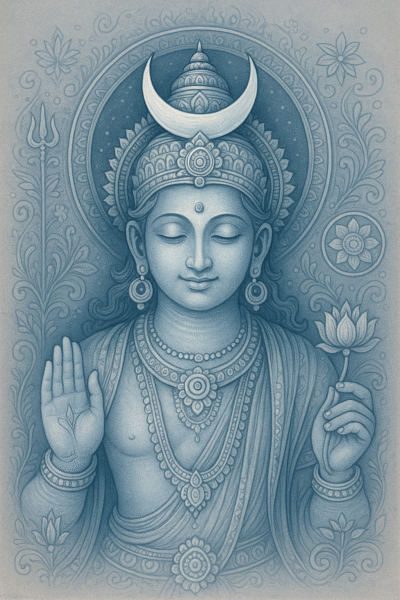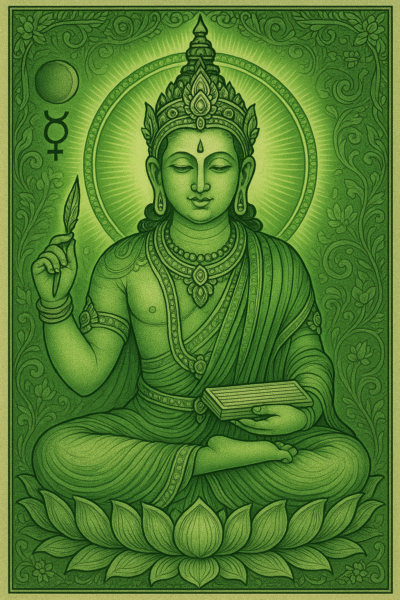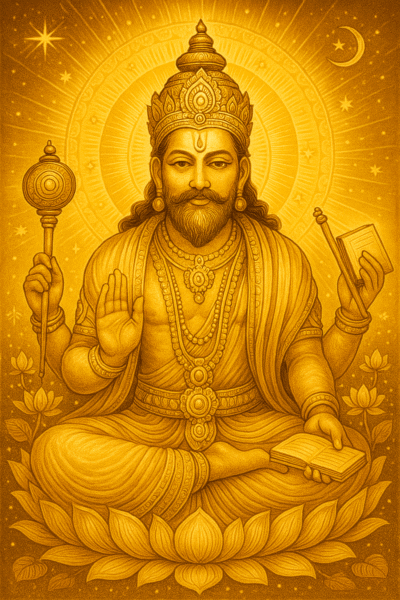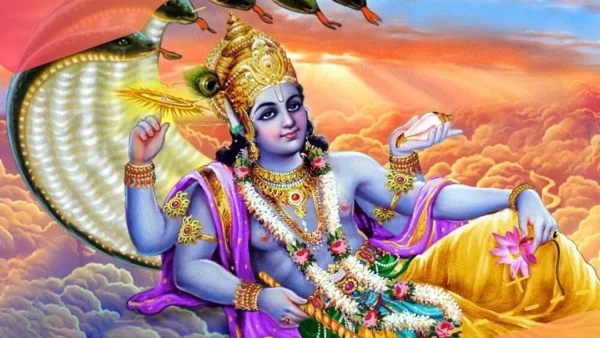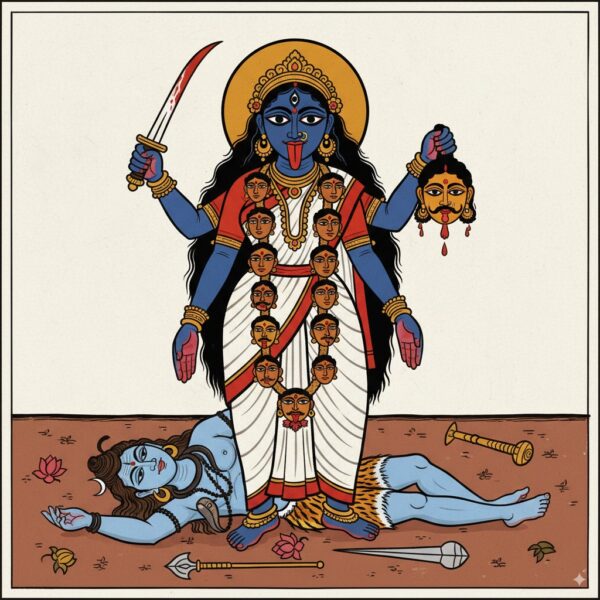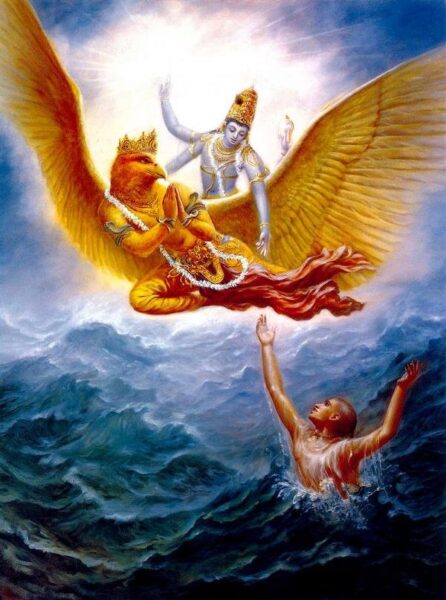Lord Vishnu - The Supreme Preserver and Protector
Lord Vishnu, revered as the Preserver and Sustainer of the universe, stands as one of the most beloved and worshipped deities in Hinduism. As the second member of the Hindu Trinity (Trimurti) alongside Brahma the Creator and Shiva the Destroyer, Vishnu embodies the cosmic principle of preservation, protection, and maintenance of dharma (righteousness) in the universe.
Introduction
Known for his infinite compassion, boundless love, and unwavering commitment to protecting devotees, Vishnu represents the stabilizing force that maintains cosmic order. His divine presence ensures that righteousness prevails and that the universe continues to function harmoniously. Through his numerous incarnations (avatars), he descends to earth whenever evil threatens to overwhelm good, restoring balance and protecting his devotees.
Vishnu's worship spans across all sections of Hindu society, from simple village shrines to magnificent temple complexes. His devotees, known as Vaishnavas, follow various traditions and practices, all unified by their love and surrender to this supremely benevolent deity.
Physical Attributes & Iconography
The Divine Form
Lord Vishnu's majestic appearance is rich with profound symbolism, each attribute representing fundamental cosmic principles:
- Four Arms (Chaturbhuja): Vishnu's four arms represent his omnipresence and ability to simultaneously perform multiple cosmic functions. They symbolize the four directions, the four Vedas, and the four goals of human life (dharma, artha, kama, moksha).
- Conch Shell (Shankha): Held in his upper left hand, the conch Panchajanya represents the primordial sound of creation (AUM), the call to dharma, and the victory of good over evil. When blown, it destroys evil and purifies the environment.
- Discus (Sudarshana Chakra): In his upper right hand, this spinning wheel represents the cosmic mind, time, and Vishnu's power to destroy evil instantly. It symbolizes the cycle of time and the divine law that governs the universe.
- Lotus Flower (Padma): In his lower left hand, the lotus represents purity, spiritual liberation, and the unfolding of creation. It symbolizes detachment, as the lotus remains untouched by the water it grows in.
- Mace (Gada): Named Kaumodaki, held in his lower right hand, it represents divine power, the destruction of ignorance, and the strength to uphold righteousness.
- Dark Blue Complexion: Vishnu's blue-black skin symbolizes the infinite cosmos, the vast sky, and the depth of divine consciousness. Blue represents serenity, stability, and the all-pervading nature of divinity.
- Yellow Garments (Pitambara): His golden-yellow clothing represents purity, prosperity, and the earth's fertility. Yellow is associated with knowledge, learning, and happiness.
- Crown and Ornaments: His jeweled crown (Kirita) and divine ornaments represent his supreme sovereignty over the universe and his role as the cosmic king.
- Sacred Thread (Yajnopavita): The sacred thread across his chest represents his adherence to dharma and his role as the protector of Vedic traditions.
- Kaustubha Gem: The brilliant gem on his chest represents pure consciousness and the individual soul's connection to the divine.
- Srivatsa Mark: The curl of hair on his chest symbolizes his beloved consort Lakshmi and represents prosperity, good fortune, and divine love.
- Garland of Forest Flowers (Vanamala): The fragrant garland represents the beauty of creation and Vishnu's love for all living beings.
Sacred Vehicle and Abode
- Garuda: Vishnu's vehicle, the divine eagle Garuda, represents spiritual knowledge, speed in helping devotees, and the power to transcend material limitations.
- Shesha Naga: Vishnu rests on the thousand-headed serpent Shesha in the cosmic ocean, representing time, consciousness, and the support of the universe.
- Vaikuntha: His celestial abode represents the ultimate spiritual realm where liberated souls reside in eternal bliss.
The Dasavatara - Ten Primary Incarnations
Vishnu's most significant aspect is his incarnations (avatars), through which he manifests to restore cosmic balance:
1. Matsya (Fish)
Purpose: Saved the Vedas and Manu (first man) during the great deluge
Significance: Protection of knowledge and life during cosmic dissolution
Lesson: Divine intervention in times of universal crisis
2. Kurma (Tortoise)
Purpose: Supported Mount Mandara during the churning of the ocean
Significance: Stability and support during cosmic events
Lesson: Divine foundation for all spiritual endeavors
3. Varaha (Boar)
Purpose: Rescued the Earth (Bhudevi) from the demon Hiranyaksha
Significance: Protection of the earth and natural resources
Lesson: Environmental conservation and respect for nature
4. Narasimha (Half-man, Half-lion)
Purpose: Destroyed the demon Hiranyakashipu to protect devotee Prahlada
Significance: Divine protection of true devotees
Lesson: Faith and devotion overcome all obstacles
5. Vamana (Dwarf Brahmin)
Purpose: Subdued the demon king Bali through humility and wisdom
Significance: Triumph of dharma through wisdom rather than force
Lesson: Humility and proper conduct lead to victory
6. Parashurama (Warrior with Axe)
Purpose: Eliminated corrupt Kshatriya rulers to restore justice
Significance: Divine intervention against oppression
Lesson: Justice and righteousness must be upheld
7. Rama (Prince of Ayodhya)
Purpose: Established the ideals of dharmic living and kingship
Significance: Perfect example of human conduct and relationships
Lesson: Duty, honor, and righteousness in all relationships
8. Krishna (Divine Cowherd)
Purpose: Established dharma and gave the world the Bhagavad Gita
Significance: Divine love, wisdom, and spiritual guidance
Lesson: Selfless action and surrender to the divine will
9. Buddha (The Enlightened One)
Purpose: Taught compassion and non-violence to reform society
Significance: Spiritual awakening and universal compassion
Lesson: Ahimsa (non-violence) and inner transformation
10. Kalki (Future Avatar)
Purpose: Will appear at the end of Kali Yuga to restore righteousness
Significance: Hope for ultimate triumph of good over evil
Lesson: Divine intervention will ultimately establish perfect order
Sacred Names & Epithets
Vishnu is known by numerous names, each highlighting different aspects of his divine nature:
- Narayana - The one who pervades all beings and is their refuge
- Madhava - The lord of Lakshmi, the sweet one
- Govinda - Protector of cows and the earth
- Hari - The one who removes suffering and sin
- Achyuta - The infallible, never-falling one
- Janardana - The one worshipped by all people
- Vasudeva - Son of Vasudeva, the all-pervading one
- Ananta - The infinite, limitless one
- Padmanabha - The one from whose navel grows the lotus
- Damodara - The one whose belly was bound by rope (Krishna's childhood)
- Sankarsana - The one who attracts and draws everything
- Vaasudeva - The one who dwells in all beings
- Pradyumna - The supremely powerful one
- Aniruddha - The unobstructed, unstoppable one
- Purushottama - The supreme person, best among beings
- Adhokshaja - Beyond sensory perception
- Narasimha - The man-lion, fierce protector
- Vamana - The dwarf incarnation
- Srinivasa - The abode of Lakshmi
- Venkatesh - Lord of Venkata hill
Major Legends & Scriptures
The Bhagavad Gita
The most profound spiritual discourse where Krishna (Vishnu's avatar) instructs Arjuna on the battlefield of Kurukshetra. This text contains the essence of Vishnu's teachings on:
- Dharma and righteous action
- The nature of the soul and Supreme Reality
- Various paths to spiritual realization
- Selfless service and devotion
- The importance of surrender to divine will
The Ramayana
The epic story of Rama's life, demonstrating ideal behavior in all relationships and situations. It teaches:
- The importance of keeping one's word
- Devotion between husband and wife
- The bond between brothers
- The responsibility of rulers to their subjects
- The power of devotion (as shown by Hanuman)
The Mahabharata
Contains numerous stories of Vishnu's interventions, particularly as Krishna. Key teachings include:
- The complexity of dharma in difficult situations
- The importance of choosing the right side in moral conflicts
- Divine friendship and guidance
- The ultimate victory of righteousness
Puranic Literature
The Vishnu Purana, Bhagavata Purana, and other texts detail:
- The creation and maintenance of the universe
- Stories of various incarnations
- The glory of devotion to Vishnu
- Descriptions of Vaikuntha (Vishnu's abode)
- The importance of bhakti (devotion)
Philosophical Significance
The Principle of Preservation
Vishnu represents the cosmic function of maintenance and preservation. This includes:
- Sustenance of Life: Ensuring the continuation of all life forms
- Maintenance of Order: Upholding natural and moral laws
- Protection of Dharma: Defending righteousness against evil forces
- Compassionate Intervention: Responding to devotees' prayers and needs
The Concept of Avatar
The avatar concept teaches several profound truths:
- Divine Accessibility: God descends to meet devotees at their level
- Cyclical Time: Divine interventions occur at regular intervals
- Hope and Faith: No matter how dark times become, divine help will come
- Multiple Manifestations: The divine can appear in any form
Bhakti Yoga - The Path of Devotion
Vishnu worship emphasizes bhakti, which includes:
- Surrender (Saranagati): Complete submission to divine will
- Love (Prema): Pure, selfless love for God
- Service (Seva): Dedicating all actions to the divine
- Remembrance (Smarana): Constant awareness of God's presence
Major Festivals & Observances
Ekadashi
Frequency: Twice monthly (11th day of each lunar fortnight)
Significance: Sacred to Vishnu, observed with fasting and prayer
Benefits: Spiritual purification and divine blessings
Practice: Complete or partial fasting, chanting, and meditation
Janmashtami
Date: 8th day of Krishna Paksha in Bhadrapada month
Significance: Celebrates Krishna's birth
Observances: Fasting, night-long prayers, drama performances
Special rituals: Decorating cradles, offering butter and sweets
Rama Navami
Date: 9th day of Chaitra month
Significance: Celebrates Rama's birth
Observances: Processions, readings from Ramayana, charitable activities
Special prayers: Chanting Rama's names and sacred texts
Vaikuntha Ekadashi
Date: Ekadashi in Margashirsha month (December-January)
Significance: Most important Ekadashi, believed to grant liberation
Special feature: Temple doors to inner sanctum (Vaikuntha Dwara) opened
Benefits: Passage through grants entry to Vaikuntha
Kartik Month
Duration: Entire month of Kartik (October-November)
Significance: Especially sacred to Vishnu
Observances: Daily worship, lamp lighting, Tulsi worship
Special practices: Damodara worship, offering lamps
Diwali Celebrations
Significance: Celebrates Rama's return to Ayodhya
Observances: Lighting lamps, decorating homes, prayers
Special meaning: Victory of light over darkness, good over evil
Sacred Mantras & Prayers
The Maha Mantra
Hare Krishna Hare Krishna, Krishna Krishna Hare Hare
Hare Rama Hare Rama, Rama Rama Hare HareThis sixteen-name mantra is considered the most powerful prayer to Vishnu in the current age.
Vishnu Sahasranama
The thousand names of Vishnu, found in the Mahabharata, is one of the most sacred texts in Vaishnavism. Regular recitation brings:
- Peace of mind and spiritual growth
- Protection from negative influences
- Fulfillment of desires and liberation
- Increased devotion and divine grace
Twelve-Letter Mantra (Dvadashakshari)
Om Namo Bhagavate Vasudevaya
This sacred mantra means "I offer my respectful obeisances unto the Supreme Lord Vasudeva"
Eight-Letter Mantra (Ashtakshara)
Om Namo Narayanaya
This mantra invokes the all-pervading aspect of Vishnu
Vishnu Gayatri
Om Narayanaya Vidmahe Vasudevaya Dhimahi Tanno Vishnu Prachodayat
Daily Prayers
- Morning: Venkatesa Suprabhatam, Vishnu Stotras
- Evening: Vishnu Sahasranama, Aarti
- Special: Purusha Sukta, Sri Sukta
Sacred Places & Pilgrimage Sites
Char Dham (Four Principal Abodes)
- Badrinath (Uttarakhand) - Vishnu as Badrinarayan
- Dwarka (Gujarat) - Krishna's kingdom
- Jagannath Puri (Odisha) - Vishnu as Jagannath
- Rameshwaram (Tamil Nadu) - Associated with Rama
Divya Desams (108 Sacred Temples)
The most important Vishnu temples mentioned in Tamil literature:
- Tirupati (Andhra Pradesh) - Venkateswara, most visited temple
- Srirangam (Tamil Nadu) - Largest functioning temple complex
- Guruvayur (Kerala) - Krishna temple famous for healing
- Udupi (Karnataka) - Krishna temple established by Madhvacharya
Avatar-Specific Sites
- Ayodhya (Uttar Pradesh) - Rama's birthplace and kingdom
- Mathura-Vrindavan (Uttar Pradesh) - Krishna's birthplace and childhood
- Kurukshetra (Haryana) - Site of Bhagavad Gita
- Ahobilam (Andhra Pradesh) - Nine temples of Narasimha
Other Important Temples
- Padmanabhaswamy (Kerala) - Ancient temple with vast treasures
- Ranganatha Swamy (Tamil Nadu) - Reclining Vishnu
- Vitthala (Maharashtra) - Popular deity of Maharashtra
- Simhachalam (Andhra Pradesh) - Narasimha temple
Worship Practices & Rituals
Daily Worship (Nitya Aradhana)
Morning Rituals:
- Wake up early and meditate on Vishnu
- Recite morning prayers and stotras
- Offer water, flowers, and food
- Light incense and lamps
- Chant mantras and holy names
Evening Worship:
- Light lamps and offer aarti
- Sing devotional songs (bhajans)
- Read sacred texts
- Perform pradakshina (circumambulation)
Special Observances
Ekadashi Fasting:
- Complete or partial fasting on the 11th lunar day
- Spend time in prayer and meditation
- Break fast on Dwadashi with prasadam
- Considered highly meritorious
Tulsi Worship:
- Daily worship of the sacred Tulsi plant
- Offering water and prayers
- Circumambulation and chanting
- Special reverence as Vishnu's beloved
Offering Practices
Traditional Offerings:
- Flowers: Lotus, Tulsi, Jasmine, Rose
- Food: Fruits, sweets, rice preparations, milk products
- Leaves: Tulsi leaves (most sacred to Vishnu)
- Incense: Sandalwood, camphor, dhoop
Special Preparations:
- Panchamrit: Mixture of milk, curd, ghee, honey, and sugar
- Chappan Bhog: 56 different food items (especially for Krishna)
- Kheer: Sweet rice pudding
- Laddus: Sweet balls made from various ingredients
Benefits of Vishnu Devotion
Spiritual Benefits
Liberation (Moksha):
- Ultimate freedom from the cycle of birth and death
- Attainment of Vaikuntha, Vishnu's eternal abode
- Realization of one's true spiritual nature
- Direct relationship with the Supreme Lord
Purification:
- Cleansing of all sins and negative karma
- Purification of consciousness and heart
- Development of divine qualities
- Freedom from material attachments
Devotional Transformation:
- Growth in love and devotion for God
- Development of humility and compassion
- Increased spiritual awareness and wisdom
- Natural inclination toward service
Material Benefits
Protection and Security:
- Divine protection from all dangers and difficulties
- Removal of obstacles in life's endeavors
- Protection from negative influences and evil forces
- Security and peace in all aspects of life
Prosperity and Success:
- Fulfillment of legitimate desires and needs
- Success in career and business ventures
- Harmonious family relationships
- Good health and longevity
Divine Grace:
- Unexpected help and support in difficult times
- Miraculous interventions and solutions
- Blessings for family and community
- Guidance in making important decisions
Psychological Benefits
Mental Peace:
- Relief from anxiety, stress, and worries
- Deep inner peace and contentment
- Stability of mind in all circumstances
- Freedom from fear and insecurity
Emotional Balance:
- Development of positive emotions and attitudes
- Control over anger, jealousy, and hatred
- Cultivation of love, compassion, and forgiveness
- Joy and happiness in daily life
Character Development:
- Growth in virtuous qualities and behavior
- Truthfulness, honesty, and integrity
- Patience, tolerance, and understanding
- Self-control and discipline
Philosophical Schools & Traditions
Major Vaishnava Sampradayas
Sri Vaishnavism (Ramanuja Tradition):
- Emphasizes qualified non-dualism (Vishishtadvaita)
- Temple worship and community service
- Integration of Tamil devotional poetry
- Surrender to Vishnu and his consort Lakshmi
Gaudiya Vaishnavism (Chaitanya Tradition):
- Pure devotion (Suddha Bhakti) as the ultimate goal
- Congregational chanting of holy names
- Krishna as the source of all Vishnu incarnations
- Emphasis on divine love and separation
Vallabha Sampradaya (Pushti Marg):
- Pure non-dualism (Shuddhadvaita)
- Krishna as the complete Supreme Being
- Grace (Pushti) as the means of realization
- Devotional service in mood of love
Madhva Sampradaya (Dvaita):
- Strict dualism between soul and God
- Bhakti supported by knowledge and detachment
- Eternal distinction between individual souls
- Hierarchy among liberated souls
Vishnu in Modern Times
Contemporary Relevance
In today's fast-paced world, Vishnu's teachings offer practical guidance:
- Dharmic Living: Ethical conduct in personal and professional life
- Balance: Maintaining harmony between material and spiritual pursuits
- Service: Dedicating work to higher purposes
- Relationships: Building loving, respectful connections with others
Global Influence
Vishnu worship has spread worldwide through:
- ISKCON Movement: International Society for Krishna Consciousness
- Yoga Philosophy: Integration of devotional practices with physical yoga
- Meditation Centers: Vishnu-centered spiritual communities
- Cultural Exchange: Hindu festivals and practices adopted globally
Environmental Connection
Vishnu's incarnations teach environmental consciousness:
- Varaha: Protection of the earth
- Kurma: Supporting cosmic balance
- Matsya: Preserving life during disasters
- Modern Application: Environmental stewardship as spiritual duty
Conclusion
Lord Vishnu represents the most accessible and compassionate aspect of the divine, always ready to help devotees who turn to him with sincerity and love. His teachings through various incarnations provide a complete guide for righteous living, spiritual growth, and ultimate liberation.
The worship of Vishnu offers a path that accommodates all temperaments and capacities - from simple chanting of his names to elaborate philosophical study, from personal meditation to community service. His promise of protection to all who surrender to him provides comfort and confidence to face life's challenges.
In Vishnu, devotees find not just a deity to be worshipped, but a loving friend, protector, and guide who accompanies them through all circumstances. His infinite compassion ensures that no sincere seeker is ever abandoned, and his divine grace gradually transforms devotees into instruments of peace and love in the world.
Whether approached as the cosmic preserver, the divine lover, the perfect teacher, or the ultimate goal of life, Vishnu responds to devotees according to their needs and understanding. His worship cultivates the highest human virtues while providing the means to transcend human limitations and realize one's eternal spiritual nature.
The path of Vishnu bhakti remains as relevant today as it was thousands of years ago, offering practical wisdom for modern life while opening the door to eternal happiness and divine love. In surrendering to Vishnu, devotees discover not only protection and prosperity in this life but the ultimate destination of the soul's eternal journey.
Om Namo Narayanaya - I offer my humble obeisances to the Supreme Lord who is the refuge of all beings and the source of infinite love and protection.

